RECENT ARTICLES
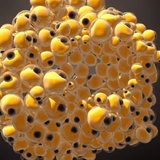
Scientists Successfully Turn Breast Cancer Cells Into Fat to Stop Them From Spreading
Researchers have been able to coax human breast cells to turn into fat cells in a new proof-of-concept study in mice.To achieve this feat, the team exploited a weird pathway that metastasising cancer cells have; their results are just a first step, but it's a truly promising approach.When you cut your finger, or when a foetus grows organs, the cells begin to look less like themselves, and more 'fluid' – changing into a type of called a mesenchyme and then reforming into whatever cells the body needs.This process is called epithelial-mesenchymal transition (EMT) and that cancer...…Researchers have been able to coax human breast cells to turn into fat cells in a new proof-of-concept study in mice.To achieve this feat, the team exploited a weird pathway that metastasising cancer cells have; their results are just a first step, but it's a truly promising approach.When you cut your finger, or when a foetus grows organs, the cells begin to look less like themselves, and more 'fluid' – changing into a type of called a mesenchyme and then reforming into whatever cells the body needs.This process is called epithelial-mesenchymal transition (EMT) and that cancer...WW…

A ‘galaxy’ is unmasked as a pulsar — the brightest outside the Milky Way
Thank you for visiting nature.com. You are using a browser version with limited support for CSS. To obtainthe best experience, we recommend you use a more up to date browser (or turn off compatibility mode inInternet Explorer). In the meantime, to ensure continued support, we are displaying the site without stylesand JavaScript.AdvertisementYou have full access to this article via your institution.Astronomers have confirmed that an object they thought was a distant galaxy is actually the brightest extra-galactic pulsar ever seen. The team made the discovery using a technique that blocks a...…Thank you for visiting nature.com. You are using a browser version with limited support for CSS. To obtainthe best experience, we recommend you use a more up to date browser (or turn off compatibility mode inInternet Explorer). In the meantime, to ensure continued support, we are displaying the site without stylesand JavaScript.AdvertisementYou have full access to this article via your institution.Astronomers have confirmed that an object they thought was a distant galaxy is actually the brightest extra-galactic pulsar ever seen. The team made the discovery using a technique that blocks a...WW…

New Research Shows Māori Traveled to Antarctica at Least 1,000 Years Before Europeans
When we think of Antarctic exploration, the narrative is overwhelmingly white. The of mainland Antarctica was attributed to a Russian expedition in 1820, while the first landing on the mainland is attributed to an American explorer in 1821.Now, a new paper by New Zealander researchers suggests that the indigenous people of mainland New Zealand - Māori - have a significantly longer history with Earth's southernmost continent.The research team, led by conservation biologist Priscilla Wehi from Manaaki Whenua Landcare Research, looked at oral histories as well as – meaning research, reports,...…When we think of Antarctic exploration, the narrative is overwhelmingly white. The of mainland Antarctica was attributed to a Russian expedition in 1820, while the first landing on the mainland is attributed to an American explorer in 1821.Now, a new paper by New Zealander researchers suggests that the indigenous people of mainland New Zealand - Māori - have a significantly longer history with Earth's southernmost continent.The research team, led by conservation biologist Priscilla Wehi from Manaaki Whenua Landcare Research, looked at oral histories as well as – meaning research, reports,...WW…

Plastics Can Be Broken Down Into Fuel, And We Just Found a Great Method For It
If you didn't know already, we have bad news – severely under-performing. waste ever produced has been recycled. Around 12 percent has been burnt, leaving 79 percent of all plastic ever produced still out there in the world.While we work out how to be less reliant on these materials, researchers have also been investigating how to reuse one of the most common types of plastic – – by turning it into fuel."Single-use plastics impose an enormous environmental threat, but their recycling, especially of polyolefins, has been proven challenging," researchers from the University of Delaware (UD)...…If you didn't know already, we have bad news – severely under-performing. waste ever produced has been recycled. Around 12 percent has been burnt, leaving 79 percent of all plastic ever produced still out there in the world.While we work out how to be less reliant on these materials, researchers have also been investigating how to reuse one of the most common types of plastic – – by turning it into fuel."Single-use plastics impose an enormous environmental threat, but their recycling, especially of polyolefins, has been proven challenging," researchers from the University of Delaware (UD)...WW…
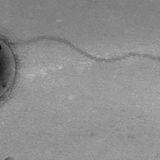
Microbes Unknown to Science Discovered on The International Space Station
The menagerie of bacterial and fungal species living among us is ever growing - and this is no exception in low-gravity environments, such as the International Space Station (ISS).Researchers from the United States and India working with NASA have now discovered four strains of bacteria living in different places in the ISS – three of which were, until now, completely unknown to science.Three of the four strains were isolated back in 2015 and 2016 – one was found on an overhead panel of the ISS research stations, the second was found in the , the third was found on the surface of the dining...…The menagerie of bacterial and fungal species living among us is ever growing - and this is no exception in low-gravity environments, such as the International Space Station (ISS).Researchers from the United States and India working with NASA have now discovered four strains of bacteria living in different places in the ISS – three of which were, until now, completely unknown to science.Three of the four strains were isolated back in 2015 and 2016 – one was found on an overhead panel of the ISS research stations, the second was found in the , the third was found on the surface of the dining...WW…
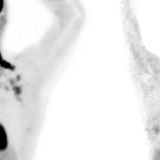
Study of Over 50,000 People Links Brown Fat With Better Health Outcomes
A large new study has provided strong evidence that people with brown fat in their bodies are less likely to suffer from a range of health conditions."For the first time, it reveals a link to lower risk of certain conditions," , Rockefeller University Hospital physician Paul Cohen."These findings make us more confident about the potential of targeting brown fat for therapeutic benefit." (BAT) is particularly common in hibernating mammals and newborns. BAT helps mammals regulate temperature - when we're really cold, the found in this type of fat tissue burn energy and produce heat. In fact,...…A large new study has provided strong evidence that people with brown fat in their bodies are less likely to suffer from a range of health conditions."For the first time, it reveals a link to lower risk of certain conditions," , Rockefeller University Hospital physician Paul Cohen."These findings make us more confident about the potential of targeting brown fat for therapeutic benefit." (BAT) is particularly common in hibernating mammals and newborns. BAT helps mammals regulate temperature - when we're really cold, the found in this type of fat tissue burn energy and produce heat. In fact,...WW…
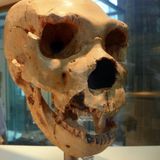
Early Humans May Have Hibernated Through Long Winters, Study Hints
While many of us might long to just , humans - unlike a lot of other mammals - don't have the capacity to hibernate.But a newly published study has investigated if early humans had this ability at some point. The results – although preliminary – surprisingly suggest that they did, even if they weren't great at it.When a bear wakes up from (a type of energy-conserving sleep state often used synonymously with hibernation), sleepy and ready for a feed, their bones and muscles will be as they were before, spared from the body's self-feeding frenzy over the winter.Bears have specialised...…While many of us might long to just , humans - unlike a lot of other mammals - don't have the capacity to hibernate.But a newly published study has investigated if early humans had this ability at some point. The results – although preliminary – surprisingly suggest that they did, even if they weren't great at it.When a bear wakes up from (a type of energy-conserving sleep state often used synonymously with hibernation), sleepy and ready for a feed, their bones and muscles will be as they were before, spared from the body's self-feeding frenzy over the winter.Bears have specialised...WW…
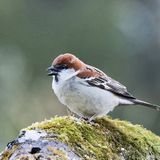
It's Not Just Humans. Sparrows Have Been Seen Using Preventative Medicine
It's fair to say that medicine is one of humanity's greatest accomplishments. From finding plants that can dull pain or slow infection, to producing effective vaccines in less than 12 months for a brand-new , we can be pretty proud of our achievements as a species.But we might not be the only species that knows certain things in nature can help treat our ills.A new correspondence paper has put forward the idea that (Passer cinnamomeus) in China are using wormwood leaves in their nest as a preventative medicine, to reduce parasites and help their babies get bigger. pregnant elephants in...…It's fair to say that medicine is one of humanity's greatest accomplishments. From finding plants that can dull pain or slow infection, to producing effective vaccines in less than 12 months for a brand-new , we can be pretty proud of our achievements as a species.But we might not be the only species that knows certain things in nature can help treat our ills.A new correspondence paper has put forward the idea that (Passer cinnamomeus) in China are using wormwood leaves in their nest as a preventative medicine, to reduce parasites and help their babies get bigger. pregnant elephants in...WW…
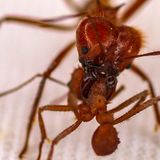
These Ants Suit Up in a Protective 'Biomineral Armor' Never Seen Before in Insects
Ants are pretty organised little creatures. Highly social insects, they know how to forage, build complicated nests, steal your pantry snacks, and generally look after the queens and the colony, all by working together.Leaf-cutter ants turn that cooperation up several notches. Leaf-cutter ant colonies like can contain millions of ants, split into four castes that all have different roles to maintain a garden of fungus that the ants eat.These farming ants might make a top-tier team of gardeners, but that doesn't mean they don't get into the occasional scrap, and living in such large groups...…Ants are pretty organised little creatures. Highly social insects, they know how to forage, build complicated nests, steal your pantry snacks, and generally look after the queens and the colony, all by working together.Leaf-cutter ants turn that cooperation up several notches. Leaf-cutter ant colonies like can contain millions of ants, split into four castes that all have different roles to maintain a garden of fungus that the ants eat.These farming ants might make a top-tier team of gardeners, but that doesn't mean they don't get into the occasional scrap, and living in such large groups...WW…
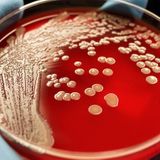
Scientists Just Discovered a Whopping 12,000 New Species of Microbes
Growing microbes in a petri dish is pretty simple – swab basically , wipe it on an agar plate, let it sit for a few days in a warm room and presto! You've grown some new furry friends. But the microbial species you can cultivate in a petri dish are only a tiny fraction of the bacteria, and other microorganisms that would have been picked up by the swab - only the ones suited to the conditions you grew them in.The overwhelming majority of them do not like the environments we can provide, and therefore won't obediently grow in a petri dish.Now, an international team of...…Growing microbes in a petri dish is pretty simple – swab basically , wipe it on an agar plate, let it sit for a few days in a warm room and presto! You've grown some new furry friends. But the microbial species you can cultivate in a petri dish are only a tiny fraction of the bacteria, and other microorganisms that would have been picked up by the swab - only the ones suited to the conditions you grew them in.The overwhelming majority of them do not like the environments we can provide, and therefore won't obediently grow in a petri dish.Now, an international team of...WW…